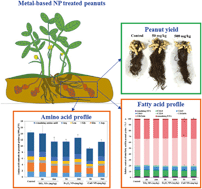Metal oxide nanoparticles alter peanut (Arachis hypogaea L.) physiological response and reduce nutritional quality: a life cycle study†
Abstract
We investigate the effects of metal oxide nanoparticles (NPs), iron oxide (Fe2O3), copper oxide (CuO), and titanium oxide (TiO2) NPs at 50 and 500 mg kg−1, on peanuts (Arachis hypogaea L.) in a full life cycle study. In order to evaluate crop quality, the amino acid and fatty acid profiles in peanut grains were analyzed across all the NP treatments. After 145 day exposure, all the three NPs had no impact on plant growth in terms of biomass, shoot height, and per plant yield, with the exception of the 500 mg kg−1 CuO NPs, where the fresh shoot biomass was significantly reduced by 44% (p = 0.0003) relative to the control. However, exposure to the three NPs significantly decreased the 1000-grain weight by 10–31% (p < 0.05), with the greatest reduction being in the 500 mg kg−1 CuO NP treatment. The elemental analysis showed that the Cu contents in grains increased in a dose-dependent manner; however, exposure to Fe2O3 and TiO2 NPs did not increase the Fe and Ti contents in the grain regardless of dose. The total amino acid content in all the NPs treated peanut grains was significantly reduced as compared to the control, but exposure to 50 mg kg−1 TiO2 NPs had no impact on the total amino acid content. Exposure to 50 and 500 mg kg−1 CuO NPs resulted in 36.2% (p = 0.000004) and 21.1% (p = 0.0001) decreases in the total amino acid content, respectively. In comparison with the control, the resveratrol content at 50 and 500 mg kg−1 CuO NP treated grains increased to 1.8 and 2.3 mg kg−1, respectively, suggesting plant stress response. Taken together, our results suggest that metal-based NPs could alter peanut crop yield and more importantly, nutritional quality. These findings raise concerns over how to safely and sustainably apply NP incorporated agrichemicals so as to protect food quality and security.



 Please wait while we load your content...
Please wait while we load your content...
